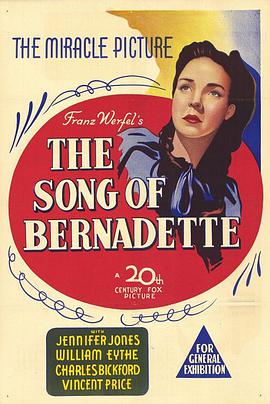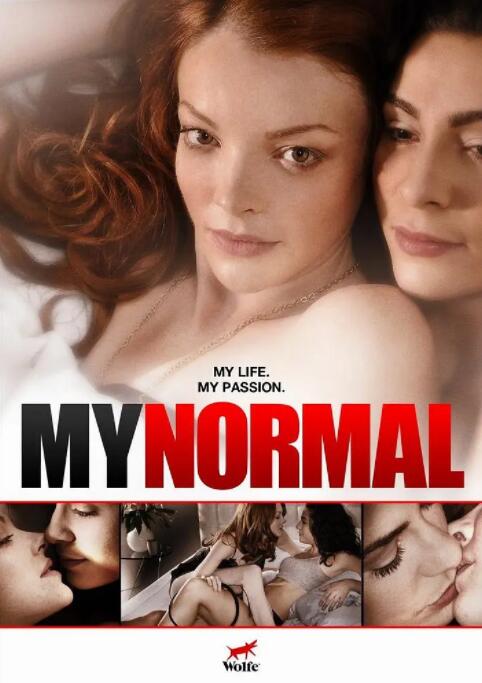情欲迷城
苏德伦,胡潇,夏念念

A vintage Hollywood faction of the incredible story of Bernadette Soubirous (1844-1879), at the age of 14, her self-purported visions of a lady in white who identified herself as “Immaculate Conception” sparked national controversy and debate, and subsequently founded the pilgrimage site in Lourdes. Starring Jennifer Jones as Bernadette, this 2-and-a-half-hour tome, based on Franz Werfel’s popular eponymous novel published in 1941, and directed by veteran hand Henry King, won 4 Oscars out of its overall 12 nominations, notably winning Jones BEST ACTRESS IN A LEADING ROLE for her first attempt at the age of 25, which also heralded her second marriage with dignitary producer David O. Selznick. Jones’ beatific, ingenuous countenance and diffident but well-honed locution compellingly reflect Bernadette’s down-hone modesty and indubitable piety of what is bestowed only to her eyes and ears, that she will never gainsay whoever her interrogators are. And most convincingly Jones dispels any semblance of self-martyrization which might theoretically undermine Bernadette’s saintly iconography. Alongside the voyage from Bernadette’s first vision in a grotto near Lourdes to her untimely demise in the convent, the saga corrals a formidable cast of talents embellishes it in the supporting roles, among which three are rewarded with an Oscar nomination, two strong female characters leave indelible marks respectively in the first and second half. Anne Revere’s Louise is the stony-faced mother of Bernadette, afflicted by the household’s immiseration (her husband François, played by a commendable Roman Bohnen, is a jobless mill worker earning pittance with demeaning odd jobs and they are four children to feed), who does swing from scolding-prone to heartfelt supportive of her daughter’s ordeal without toning down the ferocity ingrained within her persona; then there is the holier-than-thou Gladys Cooper as Sister Marie Therese Vauzou, whose stern deportment and self-willed disbelief divulge the obverse from Bernadette’s male-exclusive, higher-ranking naysayers, she is not driven by an ideological reason but a pure elemental demon, the green-eyed monster to which we can all relate (why you, not me?), and Ms. Cooper emanates sheer intensity through her hard-hitting tête-à-tête, albeit crimped by the wimple, excels in actualizing one hell of an about-face entirely on the strength of her facial expression near the end. As Abbé Dominique Peyramale, who denotes the pragmatical policy of the Catholic church on the prickly matter of commoner’s holy visions, Charles Bickford (likening an aging Joseph Cotten, anyone?) appreciatively embeds a more lenient, beneficent and high-minded personification and also delivers with a sincere avuncular amicability towards Bernadette. On the entirely different optics, Vincent Price’s debonair mien and oral cadence also strike a vehement chord as Vital Dutour, the Imperial Prosecutor who is bent on discrediting Bernadette’s enlightenment, mirroring the agnostic/atheist angle on benighted religious fools. Were it not for the occasionally functional spring water which possesses a miraculous healing power (whether it is psychosomatic or not, the film leaves it equivocal), and a divine intervention involving the henpecked Emperor Napoleon III and his wife (cameos by Jerome Cowan and Patricia Morison), Bernadette would not stand a chance to justify her flimsy story. Rarely subjected itself towards preachiness or loftiness, what is remarkable about THE SONG OF BERNADETTE lies in its matter-of-fact narratology, dialectical approach towards its subject matter and a life-affirming positiveness rising above any religious discord, as proven by Vital Dutour’s plea in the end, religion always requires a certain degree of blind faith, someone are equipped to accept that while others cannot, or at least not yet, discrimination is never the cure. A pristinely restored Hollywood flagship, this one has immensely wholesome value for anyone who cares to savor. referential entries: Henry King’s THE BLACK SWAN (1942, 6.5/10); William Dieterle’s PORTRAIT OF JENNIE (1948, 6.7/10).
收起
 0
0HD
苏德伦,胡潇,夏念念
 2023
2023克洛伊·珍娜,阿伦·维拉弗洛,希拉·斯诺
 1998
1998超清
杨嘉玲徐锦江钟真
 2009
2009正片
尼克尔·拉里贝特,Naama·Kates
 2012
2012HD
Amakawa,YumaAsami,MasatoshiKuroda,GenjinMoribayashi,JyunOdagiri,RyuuichiSaitou,HideyukiSetsune,UrufuTanaka,AkihoYoshizawa
 2023
2023正片
彼特·丁拉基,安妮·海瑟薇,玛丽莎·托梅,埃文·埃里森,哈洛·简,尤安娜·库里克,布莱恩·达西·詹姆斯,朱迪·戈德,安东尼·罗斯·科斯坦佐,塞缪尔·H·拉维尼,苏·吉恩·金,格雷格·埃德尔曼,阿罗克·梅塔,克里斯·格哈德,戴尔·索尔斯,桑多斯·迪亚兹,约瑟夫·奥尔特曼,汤米·巴克,GeorgeSheanshang,弗朗西斯卡·法里达尼
 2018
2018HD
TovinoThomas、Urvashi、SaaraDeva
 2019
2019正片
菊池正美,川原庆久,茅野爱衣,村田太志,田所梓,小清水亚美,朴璐美,植田佳奈,长江里加,伊藤美来,藤原贵弘,木村遥,东城日沙子,田上真里奈,本渡枫,藤原启治,森久保祥太郎,宫迫博之,石丸博也,田中亮一,利根健太朗,岛田敏,服卷浩司,盐屋浩三,半田裕典,森田顺平,荒井聪太,平井启二,石冢运升,山口胜平,藤本隆弘,森下由树子,上坂堇,织田优成,三浦祥朗,新井良平,松岛美野里,花江夏树,高木涉,武田幸史
 2023
2023HD
扎克·加利凡纳基斯,伊丽莎白·班克斯,莎拉·斯努克,杰拉尔丁·维斯瓦纳坦,科特·耶格尔,杰森·伯基,Madison,Johnson,Sweta,Keswani,Rowan,Delana,Howard,卡尔·克莱蒙斯-霍普金斯,阿杰·弗瑞瑟,Mariana,Novak,朱丽亚·法里诺,特雷西·邦纳,德莱尼·奎因,贝利·M·B,金·罗森,科拉·林德尔,克里斯·梅尔斯,Michael,White,罗伯特
 2016
2016塞巴斯蒂安·阿吉雷,宝琳娜·达维拉,安德烈斯·阿尔梅达,大卫·埃利斯·帕拉西奥斯,达娜厄·雷诺
 1983
1983HD
杨凤良,杨海莲,殷士琴,王润身
 2009
2009莎莉·克劳森,克里斯·普弗鲁格